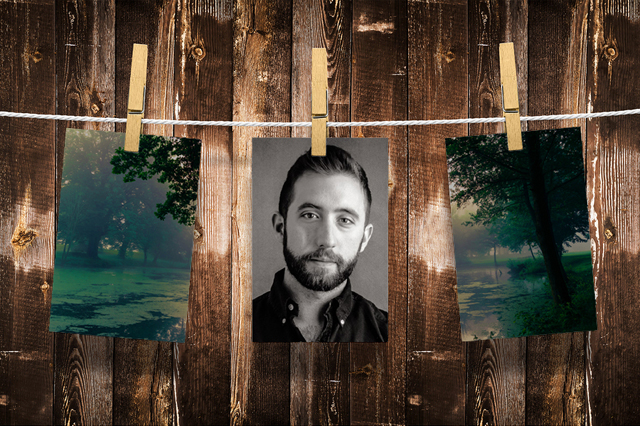
Arkansas lawyer Mike Sutton recently took First Prize in our Fall/Winter Fiction Contest. We spoke with him about his prizewinning story, “Gators,” about writing in general, and about what he has up his sleeve next.
“Gators” involves the search for John Goodroe, a father gone missing in a Louisiana swamp. The atmosphere of dread in the story feels as natural a product of that swamp as cypress trees and, well, alligators themselves. As a writer, how do you establish that tone and maintain it throughout a story like this?
For me, a story’s environment is a key component for creating and carrying a particular mood or tone. In “Gators,” I wanted the environment to feel mysterious, forgotten, and hostile, just like Goodroe. In crafting environments, I like to draw on personal experience. I spent six years with the U.S. Air Force, most of which unfolded in Bossier City. We trained in the surrounding countryside, running around in deep and dark places buried in the thicket of Louisiana and East Texas. I have fond memories of night exercises in the middle of nowhere and long treks through the woods. You could feel the life thrumming around you, you could even hear it, but couldn’t see it. Those moments are like gold veins. I’ll keep mining them for the rest of my writing life.
Your main character, a law officer named Tim Branson, narrates in a very distinctive and compelling voice. How natural is it for you as a writer to inhabit that voice?
Branson’s voice sounds like home. I grew up in Arkansas and spent a great deal of time in Louisiana and East Texas. While writing Branson’s narrative, I considered the voices of the police officers I’ve worked with over the years as well as everyday encounters here in Arkansas. I wanted the voice to feel authentic, and so I looked back to personal experiences.
When you sit down to write a story like “Gators,” do you know where it's heading, or is the experience as much a journey of discovery as it is for your characters? How much do you know about the connections between your characters at the outset of the process?
I usually don’t have a clear-cut plan for where I’m headed. There’s always an idea at the starting point, and then I wander off into the fog holding tight to that idea, hoping and working to find a plot and resolution that proves interesting. Sometimes it works. Sometimes it doesn’t.
With “Gators,” I started out knowing that I wanted people searching through swampy Louisiana woodlands for a missing person. By the end of my first draft, I was wondering why on earth Branson would care to be poking around in the woods as fiercely as he was and why Goodroe would be out there in the first place. I started working to explain those questions and the story grew deeper, adding another layer that I think made it better. It’s almost as if “Gators” gave itself life and grew from a mere seed of an idea. I just try to keep my writing interesting and stay true to the human heart, holding on wherever the story leads.
How did it feel to learn your story had won First Prize in our Fall/Winter Fiction Contest?
I think most young authors struggle with whether they’re any good at writing. I’m no different. When I checked my inbox and found a beautiful note from William Shunn, the world started spinning and my writer’s mind has been buzzing ever since. I’m so very grateful for this honor and look forward to sharing “Gators,” alongside all of the remarkable pieces showcased by The Piltdown Review.
What does the writing process look like for you? Do you approach all pieces of writing in the same way?
I write the same way I tackle most things, with discipline and persistence. My alarm starts screaming at 4:40 every morning, and I write until it’s time to head for work. I almost always handwrite the first draft. There’s something about pressing pen to the paper that helps me feel more, helps me focus and let the voice pour through. I keep a handful of stories moving at once, so if I start hitting a concrete wall on one, I move to the next and see if the stars have something for me there.
What questions about human behavior and experience interest you as a writer?
For as long as I can remember, I’ve been fascinated with human responses to grief and hardship. In other words, I’m interested in how people handle the struggles of life, including everything from the mundane to more life-altering events. I attempted to explore that idea in “Gators,” where Branson fights with the past and Goodroe sinks deeper into madness because of his childhood and current home life, all of which is bubbling in a wild and hostile environment.
What writers and books have been influential for you, not just on your style but on your subject matter? Do you consider your work to be part of the Southern Gothic tradition?
The single greatest influence in my writing life has been my good friend and mentor, Eli Cranor. He’s poured so much time and effort into my work and helped me find and hone my own voice. I owe him a tremendous debt. Larry Brown (Joe) and David Joy (The Weight of This World) are additional influences on my writing. They capture gritty day-to-day southern living in a way that leaves me drunk on the written word. Before encountering them, I personally hadn’t read much in the way of “southern” writing. I’d spent most of my time devouring authors like Ian McEwan, who writes far better than I ever hope to. I suppose my writing may fall somewhere on the outskirts of the Southern Gothic tradition, but I’m just chasing the human heart, with all of the pretty and ugly mixed up inside.
Is “Gators” a self-contained story, or do you expect to revisit any of these characters in other pieces, perhaps as part of a larger narrative? What else are you working on now?
I consider “Gators” to be a self-contained story, but the day may come when I decide there’s more to Branson and Goodroe. I have just over fifty short stories completed, with several more in the hopper. I decided to take a stab at my first novel, so that project is currently demanding most of my focus.
Besides writing, you also practice law. Where does writing fit into your daily routine? How easy or difficult is it to make time for your writing?
Writing and the legal profession go hand in hand. Most legal writing tends to be sterile, as courts often prefer a formal style that cuts to the point and avoids unnecessary creative flourishes. Legal writing needs to be clean, concise, and really ought to polish the golden nuggets of an argument and put them on display for the world (and hopefully the judge in particular) to see. That clean style of writing helps me cut and tidy up my fiction, so I can better deliver a clear idea without excessive fluff. Of course, the fluff keeps things interesting too. There’s a balance somewhere in between and finding it is half the fun.
I make writing the first thing I do every morning, after coffee of course. I prefer writing in the morning because it’s quiet and most of the sane world is still sleeping while I’m pressing pen to paper. The quiet helps me focus, helps me dig deeper in a world filled with so much noise. The legal profession can be demanding and often hates sharing time. By making writing the first thing I do every day, I ensure that I’m always putting words down and moving that ball down the field.
Read “Gators,” Mike Sutton’s prizewinning story, and see how that discipline has paid off.


